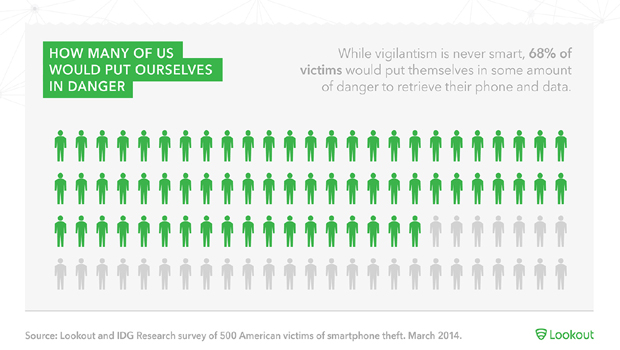How far would you go to retrieve your smartphone?
Many victims of smartphone theft would be willing to pay big or even put themselves in physical danger get their devices back, according to a new report by mobile security firm Lookout.
In 2013, 3.1 million Americans were victims of smartphone theft, according to Consumer Reports -- nearly double the number reported in 2012. More than two-thirds of them never saw their phones again.
The Lookout report points out that whether your phone is an iPhone or Android, it is now 30 times more valuable per ounce than a brick of solid silver -- and easy for a thief to convert into cash. But for the victim, it's not just about the value of the phone itself, it's also a matter of the personal data stored there. With nearly half of all adult Americans owning smartphones, these devices store more gigabytes than ever of personal information -- including contacts, banking information, email, photos and more.
According to Lookout, 50 percent of victims surveyed say they would be somewhat to extremely willing to pay $500 just to retrieve personal information from their stolen device. One-third of victims say they'd pay $1000.
Perhaps even more surprising was the fact that 68 percent of victims were willing to put themselves in some danger to get their device with all their precious data.
In addition to finding how far smartphone owners were willing to go to get back their devices, the survey found that 44 percent of smartphones were stolen because the owner had left it behind in a public setting. Phones were reported to have been stolen at restaurants, bars, nightclubs and even at work.
An overwhelming 90 percent of smartphone theft victims took action to recover their phones, while ten percent did nothing, admitting that they were unaware that there was anything they could do. Among the respondents that took action, 60 percent filed a police report and had their carrier deactivate their phone or tried to call and text their phone from another phone; 43 percent filed a report with the police; and 23 percent used an app to try to locate the phone.
There may be more hope for future phone theft victims as government officials and smartphone companies explore new solutions to combat the crime. A federal bill, the "Smartphone Theft Prevention Act," was introduced in the US Congress in February and is still in committee.
Meanwhile, officials in several states, including California and New York, have proposed legislation for a smartphone "kill switch" over the last several months, which would make the phone unusable -- and presumably unsellable -- to a thief. Despite some senators' concerns that mandating it would drive tech companies out of the state, the California Senate approved a smartphone kill-switch bill on Thursday, reported CNET.
"Thieves are not going to stop stealing smartphones until they know the smartphones are all worthless," New York Attorney General Eric Schneiderman told reporters in March.
The wireless industry also announced a "Smartphone Anti-Theft Voluntary Commitment" last month, in which device makers promised that smartphones activated after July 2015 will have a kill switch.
